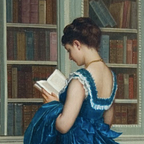The Hypocrisy of Intelligence
And importance of thinking for yourself
“Men call me chaste, they do not know the hypocrite that I am. They consider purity of the flesh a virtue, though virtue belongs not to the body, but to the soul. I can win praise in the eyes of men but deserve none before God, who searches our hearts and our loins and sees in our darkness. I am judged religious at a time when there is little in religion which is not hypocrisy, when whoever does not offend the opinions of men receives the highest praise.’’ (Letter III. Heloise to Abelard.)
In her letters of piercing self-scrutiny, Heloise d’Argenteuil declared herself on the matter of her outward piety, a hypocrite. This posed the question to me of what other types of hypocrisies we humans are guilty of, if we enact the same ruthless scrutiny. Projecting an air of intelligence strikes me instantly as one.
An ability to quote or conversationally discuss someone or something, often feels to me to be a masquerade. So many things we know come to us through secondary means. One may be able to have a conversation about Beauvoir, Byron or Balzac, but how little of what we think actually comes from our own lips? It is easier for us to fill our plates with the diluted essence of a writer, than to wade through the feast itself, to absorb a snippet of insight from the thoughts of another author’s filtered conclusions. We are made lazy in our efforts to distill them for ourselves. The internet is a blessing and an infinite curse because it lays before us an unfathomable ream of information. We are a world of Wikipedia pages, but we become professionals at quoting all, and masters of none.
“To read the thoughts of others is like taking the remains of some one else’s meal, like putting on the discarded clothes of a stranger.” On Thinking for Oneself, Schopenhauer.
There is a sense of wisdom and an intense sort of joy that comes from studied and considered reflection. Is it not better to have one-hundred books carefully read and thoughtfully absorbed than a thousand seen in passing? But then, indeed, we learn that we are not the first to be so prolific in our encyclopaedic accumulations. Montaigne was also a ‘snipper’ of information — a discerning magpie, hunting only for golden, glistening things. Rarely did he read anything cover-to-cover.
Part of me recognises the importance of instinct. Like arriving at the colossal expanse of the Louvre, there is no time to labour around — you must look where instinct urges you. You have an open mind and a curiosity to see, yes, but no time to make excuses for the things which do not call you hither. Life, I believe, demands a certain amount of selectiveness. So seek out the gold-dust, but do not let others explain their glitter.
